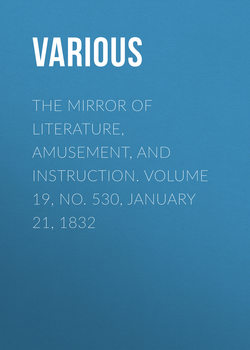Читать книгу The Mirror of Literature, Amusement, and Instruction. Volume 19, No. 530, January 21, 1832 - Various - Страница 3
THE SKETCH BOOK
ОглавлениеEVERY MAN IN HIS HUMOUR. A FRAGMENT
(For the Mirror.)
During the rage of the last continental war in Europe, occasion—no matter what—called an honest Yorkshire squire to take a journey to Warsaw. Untravelled and unknowing, he provided himself no passport: his business concerned himself alone, and what had foreign nations to do with him? His route lay through the states of neutral and contending powers. He landed in Holland—passed the usual examination; but, insisting that the affairs which brought him there were of a private nature, he was imprisoned—questioned—sifted;—and appearing to be incapable of design, was at length permitted to pursue his journey.
To the officer of the guard who conducted him to the frontiers he made frequent complaints of the loss he should sustain by the delay. He swore it was uncivil, and unfriendly, and ungenerous: five hundred Dutchmen might have travelled through Great Britain without a question,—they never questioned any stranger in Great Britain, nor stopped him, nor imprisoned him, nor guarded him.
Roused from his native phlegm by these reflections on the police of his country, the officer slowly drew the pipe from his mouth, and emitting the smoke, "Mynheer," said he, "when you first set your foot on the land of the Seven United Provinces, you should have declared you came hither on affairs of commerce;" and replacing his pipe, relapsed into immovable taciturnity.
Released from this unsocial companion, he soon arrived at a French post, where the sentinel of the advanced guard requested the honour of his permission to ask for his passports. On his failing to produce any, he was entreated to pardon the liberty he took of conducting him to the commandant—but it was his duty, and he must, however reluctantly, perform it.
Monsieur le Commandant received him with cold and pompous politeness. He made the usual inquiries; and our traveller, determined to avoid the error which had produced such inconvenience, replied that commercial concerns drew him to the continent. "Ma foi," said the commandant, "c'est un negotiant, un bourgeois"—take him away to the citadel, we will examine him to-morrow, at present we must dress for the comedie—"Allons."
"Monsieur," said the sentinel, as he conducted him to the guard-room, "you should not have mentioned commerce to Monsieur le Commandant; no gentleman in France disgraces himself with trade—we despise traffic; you should have informed Monsieur le Commandant, that you entered the dominions of the Grand Monarque to improve in dancing, or in singing, or in dressing: arms are the profession of a man of fashion, and glory and accomplishments his pursuits—Vive le Roi."
He had the honour of passing the night with a French guard, and the next day was dismissed. Proceeding on his journey, he fell in with a detachment of German Chasseurs. They demanded his name, quality, and business. He came he said to dance, and to sing, and to dress. "He is a Frenchman," said the corporal—"A spy!" cries the sergeant. He was directed to mount behind a dragoon, and carried to the camp.
There he was soon discharged; but not without a word of advice. "We Germans," said the officer, "eat, drink, and smoke: these are our favourite employments; and had you informed the dragoons you followed no other business, you would have saved them, me, and yourself, infinite trouble."
He soon approached the Prussian dominions, where his examination was still more strict; and on answering that his only designs were to eat, and to drink, and to smoke—"To eat! and to drink! and to smoke!" exclaimed the officer with astonishment. "Sir, you must he forwarded to Postdam—war is the only business of mankind." The acute and penetrating Frederick soon comprehended the character of our traveller, and gave him a passport under his own hand. "It is an ignorant, an innocent Englishman," says the veteran; "the English are unacquainted with military duties; when they want a general they borrow him of me."
